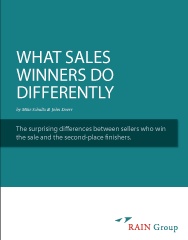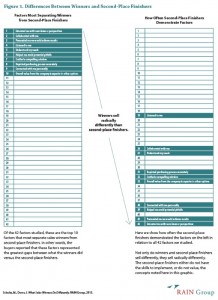Credibility, Trust and Ignorance
Being right is vastly overrated.
Now, that doesn’t mean that lying is a good strategy. What it does mean is that in the business world, we all too easily conflate trust with credibility, and credibility with expertise.
You don’t have to look too far to find big-name sales trainers and gurus who insist that it is expertise and insights that drive sales success and trust.
I first heard this mantra back in the 70s (and if I were older, I’m sure I’d know of earlier instances).
Well, here’s some truth. People don’t trust you just because you’re smart. And they definitely don’t trust you because you’re a smart-aleck.
In fact, smart is not even a necessary condition for trust – much less a sufficient condition. Further, the role of expertise and insight doesn’t come temporally first in selling – it plays a role in marketing, and then later a role nearer the middle of the sales process.
Credibility, insight, expertise, smarts – all these things do have a role. It’s just not what you may think.
Let me explain a bit further…
——
I long ago attended a sales call with my boss. When asked by the client, “What experience do you have doing this [narrowly defined] kind of work?” he shocked me by saying, “None that I can think of; what else would be useful for us to talk about?”
How is it that we come to influence other people’s ideas? How do we more effectively get others to take our advice? How do we sell more successfully?
The overwhelming answer in the corporate world seems to be, “By getting people to see that we have the right insights and answers.” But that response is very often wrong.
“Being right” turns out to be vastly overrated. Sometimes, even an admission of ignorance is actually a better strategy.
Misconceptions About Trust – How to Gain Credibility
Most of us think something along these lines: “They’ll take my advice (or buy from me, or be persuaded by me) if they think I’m credible. They’ll think I’m credible if I look smart, have great ideas, and have experience. Therefore I’ll tell them about myself, my bright ideas, and my track record at being smart.”
Clients contribute to this subornation by asking us to talk about precisely that (not because they care about the answer, but because they just don’t know what else to ask and don’t want to take the risk of looking foolish themselves).
But credibility isn’t the only element driving trust. And experience and smarts aren’t the only ways to get credibility. Think of the arrogance implicit in saying “let me tell you why I’m the best” before the customer feels you even know their situation. (This is a description of 98 out of 100 cold call emails you get from email “marketers”).
For example, consider humility. Being willing to acknowledge obvious ignorance creates rather than destroys credibility. The ability to say, as my boss did, “I don’t know,” is an astonishing comment. It communicates ignorance, yes – but it also communicates radical honesty (who is about to doubt an admission of ignorance!).
- It communicates a sense of self-confidence (“I am secure enough in my worth and my value to admit exactly what I do and don’t know”).
- It communicates a clear customer-focus – it says, “You asked a good question, and you deserve a straight, no-spin-control answer. Here it is.”
- It communicates a focus on the long-term – it says, “If this particular piece of knowledge is key, then I may not win this job; but by being always transparent about what I do know, clients will always know they can trust what I say.”
By contrast, leading with smarts alone just says, “I am a database with a protein user interface.”
The Role of Truth
The point is not to adopt a profession of ignorance as a tactic. Nor is it to pursue ignorance as policy. It’s to tell the truth. Your credibility is not just a function of expertise: it’s a result of a complex set of calculations made by someone when they decide whether to believe and trust you when you say something.
Even if people believe you—credibility—that isn’t enough to get you trusted. They must also trust your motives, your understanding of their situation, and your ability to empathize—as they see it.
True credibility comes from letting people see you as you are—not as you would wish they would see you. Transparency trumps expertise. The more you insist on how much you know, the less we believe you: “the lady doth protest too much.” The more willing you are to honestly admit your limitations, the more we believe you. It’s a paradox thing.
No one expects an advisor or salesperson to be perfect—we just want to know where their biases or blind spots lie, whether they know their own biases – and whether they’re capable of admitting them.
That way we can make up our own minds about how much to trust them.
Letting our clients make that decision is, itself, a driver of trust.


